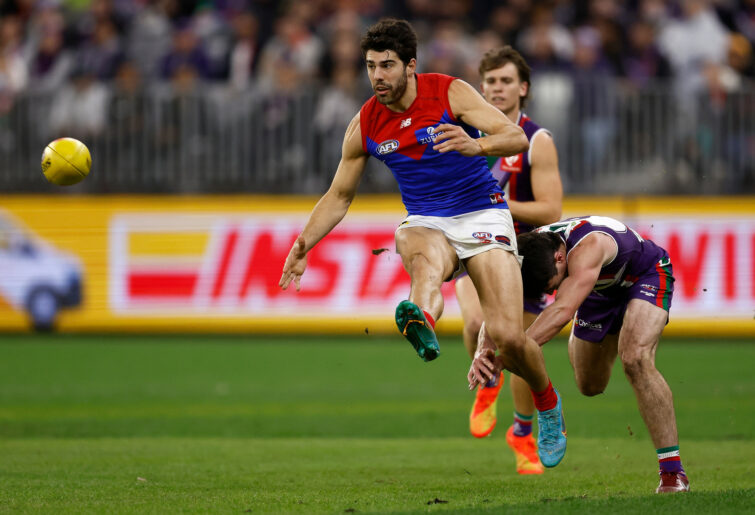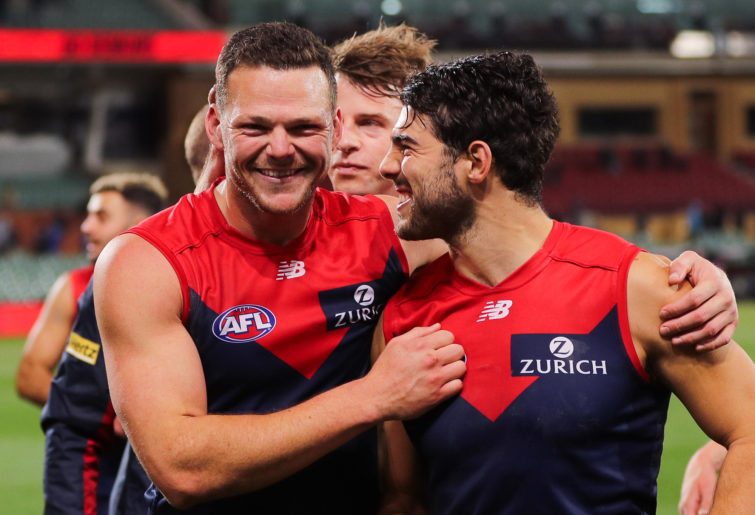Footy Fix: Tigers try to drag Dees down to their level and beat them with experience - and it nearly works
There's an old saying that you should never argue with an idiot, because they'll drag you down to their level and then beat you…
Opinion
It’s Melbourne’s defence, not its attack, that could cost the Demons a flag in 2022.
Many have gone down the path of writing last year’s champions off – perhaps it’s the failure to match the impossibly high standards they set in 2021, or maybe it’s the fact they’re 3-5 against teams in the top eight.
Predominately, though, media and AFL fans alike have jumped up and down repeatedly about the lack of attacking presence the Demons have inside 50, citing that as the reason why the team is less of a contender than they have been previously.
Yet this criticism, concerned with the offensive limitations the Demons suffer from, is pretty misguided when in reality, the biggest concern facing Simon Goodwin and his team is in the backline.
Overall, the Demons have still conceded the fewest points per game (67.6) through 20 rounds, which is the same ranking as they had last season, just two points more per game (65.59).
To appease those that believe it’s solely an attacking issue, they’ve dropped from fifth to seventh overall, but are averaging 87.1 points per game in 2022 compared to 85.82.
Given the recent struggles, it seems more appropriate to highlight the games against top-eight teams in each season, to which the points per game has dropped from 79.3 to 75.38, while they points conceded has jumped from 65.8 to 72.75.
There’s no doubt that the Demons are a forward target short of being a strong attacking team, but let’s keep in mind that it wasn’t particularly restrictive on their dominant 2021.
Tom McDonald’s absence has hurt given he kicked 33 goals in 2021, but the Demons have been smarter with their use of Max Gawn this year to use him as a target, while Christian Petracca kicking 16.27 in his 20 games, compared to 29.19 last season, has hurt.

(Photo by Paul Kane/Getty Images)
Ultimately, the only manageable change that can be done offensively for the rest of this season is more accurate goalkicking.
A more accurate season would’ve had them operating at a better level than last season in attack and the complaints were few and far between when they put 140 points on the board against the Bulldogs in the grand final.
Rather, it’s the defence that has emerged as the bigger issue and we needn’t look any further than the Round 21 clash against Collingwood to see it.
Sure, the Magpies scoring 96 points on accurate kicking was a factor, but consider the ease in which they were able to hit the scoreboard. Collingwood had 21 scoring shots from 41 inside 50s, increasing their total 51.22 per cent of the time they entered their attacking 50.
Steven May was there, Harrison Petty held down a key defensive spot and absolutely, Jake Lever was floating around in defence.
Yet the unpredictable attacking style of Collingwood was too much for Melbourne to handle and they scored with ease.
It has been an issue for the Demons throughout the season, but all the focus has solely been on their attack.
Melbourne is actually conceding one less inside 50 than they did last season, but points conceded per inside 50 has increased from 1.33 to 1.40.
The Demons are conceding scoring shots in 39.63 per cent of inside 50s. Last year it was at an incredible 34.82 per cent.
Let’s not get things too twisted here – that’s still ranked second in the league, a percentage point behind Fremantle as the most miserly defence in the league.
But again, if we move our focus towards fellow prospective finalists, we can see that they score in 43.22 per cent of inside 50s against the Demons, which for comparison’s sake, is leakier than Adelaide’s on the entire season.
What’s astonishing is that Melbourne’s defensive drop-off has coincided with an incredible solo season from May, who has lost just 9.7 per cent of one-on-one contests.

(Photo by Matt Turner/AFL Photos)
Petty and Lever too are a little above league average, while it’s Michael Hibberd losing 42.9 per cent of his contests as the lockdown small defender causing some more issues at ground level.
We can speculate on a couple of issues that have contributed to the drop-off.
Certainly, that covering of small forwards at ground level has been off. Perhaps there’s a cohesion and maybe even trust issue in Hibberd having to do the bulk of that work, meaning the talls have to peel off more frequently than they’d like.
Purely focusing on the back six though is hardly appropriate, given the Demons’ drop off in pressure overall.
Last season, they were the No.1 tackling team, averaging 62.2 a game. In 2022, they’re ranked 15th with an average of 56.7.
They’re still a top-four team for tackles inside 50, but they’re averaging 1.3 fewer per game than they did last year.
Clearly though, the Demons have benefitted greatly from strong structures up the field, particularly the defensive positioning of certain players.
While turnovers forced have dropped by three, the Demons still rank second in the statistic and looked extremely good with Jack Viney covering the back of stoppages and when Angus Brayshaw roamed freely across the defensive arc.
Consider the efficiency in which opposition teams are starting to score when breaching the Demons’ defensive 50 and you quickly realise that if Melbourne wasn’t so good higher up the ground with their structure, they’d concede a lot more inside 50s, a lot more goals and perhaps that is why no one has focused on the defence.
Now, the obvious question is, just how hard will it be for Melbourne to exorcise these defensive demons?
Put simply, anyone who has written the club off as a genuine contender is playing with fire, as the Demons are not so far behind Geelong overall.
We must take into account that once Petty broke into the Demons’ team as a regular in Round 8 last season, himself, Lever and May missed one game combined from that point on.
This season, the trio has missed 13 games so far, meaning team hasn’t quite had their preferred group on the park at all times.
When all three players have been in the team this season, Melbourne has won seven and lost three games.
Also consider the fact that upon signing a contract extension, Angus Brayshaw has been moved to the midfield.
It seems peculiar that Goodwin would play that card at this stage of the season and it’s certainly one that will have piqued the interest of opposition coaches.
It wouldn’t surprise in the slightest if Brayshaw is moved back to the floating, intercepting role sooner rather than later to help protect the defensive 50, a wildcard that the coach has seemingly tucked away for now.
Should the Demons stay fit in defence and increase their tackling pressure, then there’s a case to argue that the team is as dangerous, if not more than last season.
Offensively, it has simply been inaccuracy that has been costly rather than lack of personnel.
With the potential to miss out on a top-four spot however, the margins are fine and the Demons need to make their moves now in order to secure the safest route to a deep September run.
What has been their biggest strength for the last 18 months has turned into their biggest source of vulnerability.
If the Demons can acknowledge this and make minor changes to their defensive plans, we are most certainly looking at back-to-back premiers ruling the competition.